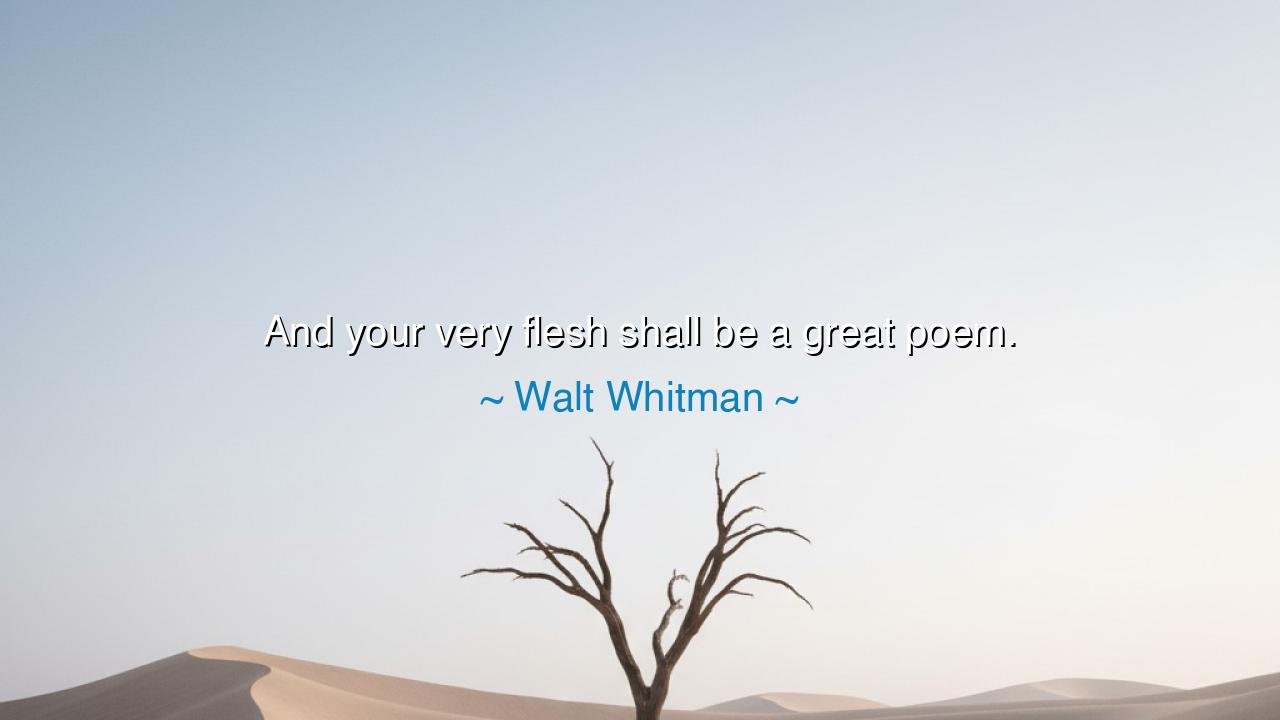
And your very flesh shall be a great poem.






The great American poet Walt Whitman, prophet of the human spirit, once wrote: “And your very flesh shall be a great poem.” These words, drawn from the preface to his monumental work Leaves of Grass (1855), blaze with both mystery and revelation. In this declaration, Whitman speaks not of ink and parchment alone, but of life itself as poetry—of the body and soul as verses written by the hand of existence. To him, each person is a living poem, breathing lines of experience and emotion, shaped by both joy and struggle. His was not a cold philosophy, but a song of exaltation: that the divine resides within flesh, and that the simplest human being can embody the beauty and grandeur of the universe.
Whitman lived in an age when poetry was often confined to the lofty and the refined. Yet he broke those boundaries with revolutionary passion, declaring that the common man and woman were as sacred as kings and prophets. When he wrote, “your very flesh shall be a great poem,” he was proclaiming that holiness is not distant—it beats within your veins. The human body, once regarded as lowly or sinful by puritanical thought, he saw as divine expression, a living scripture of creation. In every pulse, every breath, every act of love and labor, he saw poetry unfolding. For Whitman, life itself was art, and to live fully, freely, and authentically was to write a masterpiece upon the canvas of being.
His words also arose from his deep belief in democracy and equality. In Whitman’s vision, no person was more poetic than another—each carried within them the same potential for beauty and meaning. Just as no two leaves of grass are identical, yet each contributes to the splendor of the field, so too does every life add its unique rhythm to the world’s song. He urged humanity to embrace itself—to honor the body, to respect its desires, to celebrate its mortality—for even in death, poetry continues, transforming form into memory, and memory into eternity.
We see the truth of Whitman’s words reflected in the lives of those who have lived poetically through action. Consider Helen Keller, who, though blind and deaf, turned her very existence into a hymn of perseverance and understanding. Her life became a poem not of words, but of triumph—proof that the human spirit can turn limitation into radiance. Or think of Mahatma Gandhi, whose frail frame carried the strength of nations, and whose acts of peace spoke louder than any verse. Their flesh became poetry, their lives embodiments of purpose and love, echoing Whitman’s sacred creed: that the human form, animated by vision and virtue, becomes divine art.
But Whitman’s message also carries challenge. To make one’s flesh a great poem is not a passive gift—it demands awareness. It asks that we live deliberately, that we infuse our every act with meaning and grace. The poet’s call is not to perfection, but to presence—to inhabit one’s life so completely that even the simplest gesture becomes luminous. When we eat, walk, labor, or embrace, we are writing the verses of our existence. The tragedy of modern life, Whitman might say, is not that people suffer, but that they live unconsciously, allowing the poem within them to go unread.
There is a deep moral strength in this teaching. Whitman’s vision sanctifies the human experience, calling us to see the sacred in the ordinary. He reminds us that the divine is not elsewhere—it is here, in the flesh, in the breath, in the act of being. To treat your life as a poem is to move through the world with reverence, to recognize beauty not as something you must find, but as something you already are. Your scars, your joys, your failures—all are stanzas in your epic. To deny them is to erase your art; to embrace them is to give your poem its truth.
The lesson is radiant and eternal: live as a poet of your own existence. Let your days be written in courage and kindness. Do not wait for greatness to be bestowed—live it now, in your gestures, in your compassion, in the care with which you inhabit your own body and spirit. Practical action: treat your life as sacred text. Honor your health, speak truth with beauty, labor with love, and see each day as a verse in the unfolding masterpiece of your soul.
Thus, when Whitman proclaims, “And your very flesh shall be a great poem,” he does not speak only to artists, but to all humankind. He declares that to be alive is to be divine creation in motion, that the body itself is scripture, and the heart its author. If we live with wonder and authenticity, then our existence—our laughter, our tears, our striving—shall indeed become poetry. And in that sacred realization, we discover what Whitman himself knew: that life, when lived with reverence, is not merely endured—it is sung.






AAdministratorAdministrator
Welcome, honored guests. Please leave a comment, we will respond soon